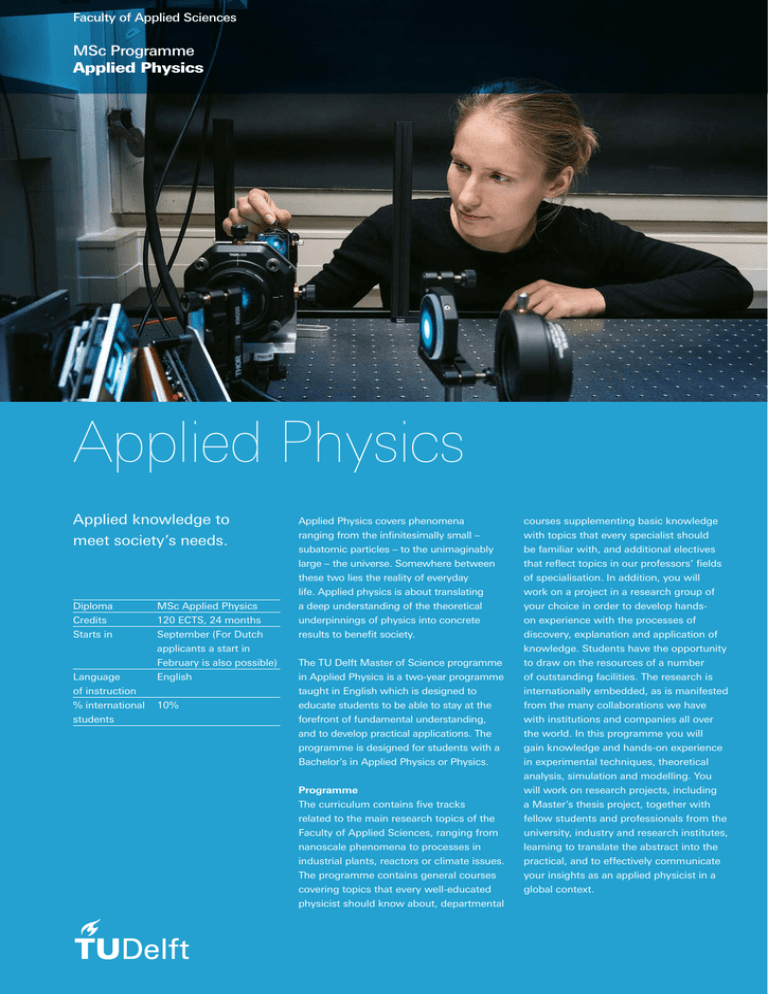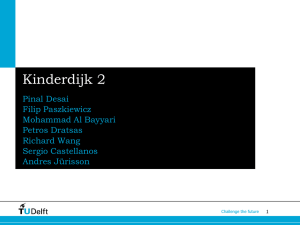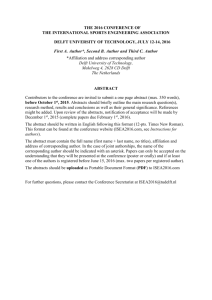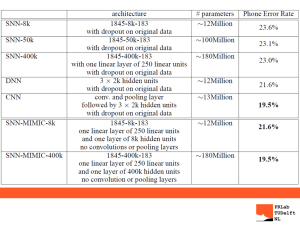MSc Applied Physics Programme at TU Delft
advertisement

Faculty of Applied Sciences MSc Programme Applied Physics Applied Physics Applied knowledge to meet society’s needs. Diploma Credits Starts in Language of instruction % international students MSc Applied Physics 120 ECTS, 24 months September (For Dutch applicants a start in February is also possible) English 10% Applied Physics covers phenomena ranging from the infinitesimally small – subatomic particles – to the unimaginably large – the universe. Somewhere between these two lies the reality of everyday life. Applied physics is about translating a deep understanding of the theoretical underpinnings of physics into concrete results to benefit society. The TU Delft Master of Science programme in Applied Physics is a two-year programme taught in English which is designed to educate students to be able to stay at the forefront of fundamental understanding, and to develop practical applications. The programme is designed for students with a Bachelor’s in Applied Physics or Physics. Programme The curriculum contains five tracks related to the main research topics of the Faculty of Applied Sciences, ranging from nanoscale phenomena to processes in industrial plants, reactors or climate issues. The programme contains general courses covering topics that every well-educated physicist should know about, departmental courses supplementing basic knowledge with topics that every specialist should be familiar with, and additional electives that reflect topics in our professors’ fields of specialisation. In addition, you will work on a project in a research group of your choice in order to develop handson experience with the processes of discovery, explanation and application of knowledge. Students have the opportunity to draw on the resources of a number of outstanding facilities. The research is internationally embedded, as is manifested from the many collaborations we have with institutions and companies all over the world. In this programme you will gain knowledge and hands-on experience in experimental techniques, theoretical analysis, simulation and modelling. You will work on research projects, including a Master’s thesis project, together with fellow students and professionals from the university, industry and research institutes, learning to translate the abstract into the practical, and to effectively communicate your insights as an applied physicist in a global context. Curriculum Applied Physics The Applied Physics programme is a two-year Master’s programme and comprises 120 EC. 1 EC = 28 hours of study, according to the European Credit Transfer System (ECTS). The programme has a core - specialisation structure, is very flexible and offers many possibilities to tailor it to your own interests. The actual programme you follow is determined by selecting courses from one of the tracks as well as additional specialisations. Roughly speaking, the first year comprises course work, while the second year is primarily devoted to thesis work and often an industrial internship. The core programme comprises 90 EC and has the same structure for all tracks and students: • 12 EC of general advanced physics modules: choose 2 out of 4 courses. • 12 EC of departmental/track electives: choose 2 out of 25 courses. • 9 EC Mathematical Methods for Physics. • 3 EC Ethics and Engineering. You will explore the ethical and social aspects and problems related to technology and to your future work as a professional. • 6 EC thesis related electives. • 48 EC Master’s thesis work to be carried out in one of the departments of the faculty of Applied Sciences. Ethics, 3 Mathematical Methods, 9 Thesis related Elective, 6 D-list, 12 Specialization, 30 G-list, 12 Master End Project, 48 Combining the core programme with a 30 EC specialisation completes the Master’s programme. The specialisation allows for either a deepening or a broadening of your degree programme. You can choose one of eight specialisations: • Research and Development (R&D) • Astronomy and Instrumentation (AI) • Nuclear Science and Engineering (NSE) • Technology in Sustainable Development (TiSD) • Education (Ed1/Ed2) • Management of Technology (MoT) • Annotation in Entrepreneurship (AE) • Casimir pre-PhD (Cas) The R&D, NSE and TiSD specialisations have three-month industrial internships (18 EC). The programme and all modules are described in detail in www.ap.msc.studyguide.tudelft.nl The Casimir Pre-PhD special programme prepares students for a PhD position within the Kavli Institute of Nanoscience in Delft or the Leiden Institute of Physics Research (LION) at Leiden University. This programme provides optimal preparation to students who wish to pursue a PhD in one of the focus research areas of the Casimir graduate school (Bionanoscience, and Quantum Nanoscience). Students in this programme can choose a PhD position after two years, provided they have demonstrated in the first two years of the programme that they possess the requisite skills. The programme is also excellent preparation for a PhD position outside Delft or Leiden. “ Programme Tracks Within the Master’s programme, students choose one of the following five tracks: Bionanoscience is dedicated to research at the interface between nanoscience, synthetic biology and cell biology. Applying nanotechnology in order to explore and engineer biology is the essence of bionanoscience. This track focuses on the functioning of single cells in all their complexity, down to the molecular level. Imaging Physics. Problems addressed in this track include optical images of colliding galaxies taken by the Hubble telescope, acoustic images of underground seismic structures and magnetic resonance images of the human body. Quantum Nanoscience studies quantum phenomena and exploits novel principles in nanostructured devices. The unusual behaviour of the quantum world is revealed in delicate experiments, geared towards developing building blocks for devices with unprecedented functionality and scale. Radiation Science and Technology is tied together by the concept of radiation. The focus of the research is on energy and health. While the topics addressed – covering materials, sensors and instrumentation, energy and sustainable production and health – vary widely, all the research within this track is somehow related to radiation. Transport Phenomena and Fluid Flow considers flow and transport phenomena over a wide range of time and length scales in their mutual dependence. This includes the interplay between chemical reactions, turbulent eddies, bubbles, flow and convective transport on the scale of the vessel or at a long range. Graduation projects Some examples of recent graduation projects are: • Development of a photoswitchable fluorescent probe for super-resolution microscopy • Majorana fermions in InSb-nanowires with superconducting and normal contacts • Droplet dynamics in swirling flow • Terahertz radiation from optical antennas embedded in copper(I)oxide • Uncertainty quantification of radionuclide release models using non-intrusive polynomial chaos Javier Azpiroz Korban (Spain) The MSc Applied Physics programme at TU Delft initially attracted me due to its excellent international reputation and high degree of customisability, with a multitude of challenging and stimulating courses that I could tailor specifically to my interests. In addition, I have been thoroughly impressed by the superb quality of teaching; all professors are clearly passionate about their subject and care about imparting both their knowledge and enthusiasm to the students. All faculty members from professors to PhD students are very open and approachable, creating a collaborative and inviting atmosphere that makes you feel like a valuable member of the department. TU Delft also benefits greatly from its close connections with industry, meaning that research at the university is always highly relevant to the modern challenges facing our society. The resulting combination is a dynamic and rewarding study environment, giving me a solid foundation for my future career. ” Admission requirements and application procedures BSc degree from a Dutch university Graduates with a BSc in Applied Physics are eligible for admission. BSc graduates in Physics are admitted but may sometimes be required to take an additional BSc module of at most 6 EC within the Master’s programme. Students who hold a Bachelor’s degree in a related field, like Aerospace Engineering, Electrical Engineering, Mathematics, or Mechanical Engineering are required to follow a bridging programme. Application proceeds through Studielink: tudelft.studielink.nl It is recommended to contact the Master’s Coordinator before applying. Degree from a Dutch university of applied sciences (Dutch HBO) Applicants with a degree in Applied Physics may be eligible for admission after completing a bridging programme. As a guideline a minimum Grade Point Average of 75% is required for admission to the bridging programme, and proof of English language proficiency of at least 90 on the TOEFL or an overall Band score of at least 6.5 on the IELTS (academic version). International applicants International applicants must meet the general admission requirements of TU Delft. 1. A BSc degree (or a proof that you have nearly completed a BSc programme) in Physics or Applied Physics 2. A BSc Cumulative Grade Point Average (CGPA) of at least 75% of the scale maximum 3. Proof of English language proficiency: A score of at least 90 on the TOEFL or an overall Band score of at least 6.5 on the IELTS (academic version) Introduction week All international students will be welcomed with the award winning introduction programme. The introduction consists of a variety of workshops and projects, during which you will get to know other international students, visit the highlights of Delft and learn the ins and outs of the TU Delft campus. Please visit the webpage for all details, along with a full list of requirements, deadlines and contact information: www.ap.msc.tudelft.nl For international students, the application period starts in October and closes at April 1. To start an MSc application, complete the online application and pay the refundable application fee of € 100. Next, you will receive an email with the link to upload the required documents. Please note that you should apply early, before December 1, if you wish to apply for a scholarship as well. For more information about the application procedure and studying at TU Delft in general, go to: www.admissions.tudelft.nl The application procedure is conducted through Studielink: tudelft.studielink.nl Prospective students are advised to contact the Master’s Coordinator before applying. Further information for Dutch applicants Arno Haket MSc, Master’s Coordinator T +31 (0)15 27 85582 E info-ap@tudelft.nl Further information for international applicants Ms. Tamara Bacsik, International Graduate Recruitment Officer T +31 (0)15 27 88180 E msc-tnw@tudelft.nl www.facebook.com/TUDelft @DelftUniversity instagram.com/TUDelft www.campus.tudelft.nl Faculty of Applied Sciences Lorentzweg 1 2628 CJ Delft November 2014 For further information Please visit the webpage for all details, complete requirements, deadlines and contact information: www.ap.msc.tudelft.nl.



